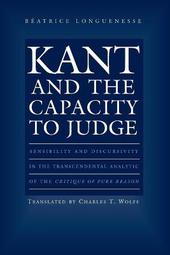
|
Kant and the Capacity to Judge: Sensibility and Discursivity in the Transcendental Analytic of the Critique of Pure Reason
Paperback / softback
Main Details
| Title |
Kant and the Capacity to Judge: Sensibility and Discursivity in the Transcendental Analytic of the Critique of Pure Reason
|
| Authors and Contributors |
By (author) Beatrice Longuenesse
|
| Physical Properties |
| Format:Paperback / softback | | Pages:440 | | Dimensions(mm): Height 235,Width 152 |
|
| Category/Genre | Philosophy - epistemology and theory of knowledge
Philosophy - logic |
|---|
| ISBN/Barcode |
9780691074511
|
| Classifications | Dewey:121 |
|---|
| Audience | | Professional & Vocational | | Tertiary Education (US: College) | |
|---|
| Illustrations |
2 line illus.
|
|
Publishing Details |
| Publisher |
Princeton University Press
|
| Imprint |
Princeton University Press
|
| Publication Date |
23 January 2001 |
| Publication Country |
United States
|
Description
Kant claims to have established his table of categories or "pure concepts of the understanding" according to the "guiding thread" provided by logical forms of judgment. By drawing extensively on Kant's logical writings, Beatrice Longuenesse analyzes this controversial claim, and then follows the thread through its continuation in the transcendental deduction of the categories, the transcendental schemata, and the principles of pure understanding. The result is a systematic, persuasive new interpretation of the Critique of Pure Reason. Longuenesse shows that although Kant adopts his inventory of the forms of judgment from logic textbooks of his time, he is nevertheless original in selecting just those forms he holds to be indispensable to our ability to relate representations to objects. Kant gives formal representation to this relation between conceptual thought and its objects by introducing the term "x" into his analysis of logical forms to stand for the object that is "thought under" the concepts that are combined in judgment.This "x" plays no role in Kant's forms of logical inference, but instead plays a role in clarifying the relation between logical forms (forms of concept subordination) and combinations ("syntheses") of perceptual data, necessary for empirical cognition. Considering Kant's logical forms of judgment thus helps illuminate crucial aspects of the Transcendental Analytic as a whole, while revealing the systematic unity between Kant's theory of judgment in the first Critique and his analysis of "merely reflective" (aesthetic and teleological) judgments in the third Critique.
Author Biography
Beatrice Longuenesse is Professor of Philosophy at Princeton University. Her other books include Hegel et la Critique de la Metaphysique.
Reviews"An original and illuminating treatment of the relationship between concepts and intuitions, sensibility and discursivity, in Kant's critical project... A fascinating and imaginative reconstruction of Kant's theory of quantity... Longuenesse has perceptively illuminated important aspects of [the] problem lying at the heart of Kant's theory of the categories."--Michael Friedman, Zeitschrift fur Geschichte der Philosophie "Beatrice Longuenesse has written a bold, important, and exciting book concerning the major arguments of the Transcendental Analytic. Moreover, the entire work is organized around a central thesis that runs directly counter to most contemporary readings of the Critique... I think that it is fair to say that from now on no serious interpreter will be able to ignore either the 'guiding thread' itself or her analysis of it."--Henry Allison, Inquiry
|